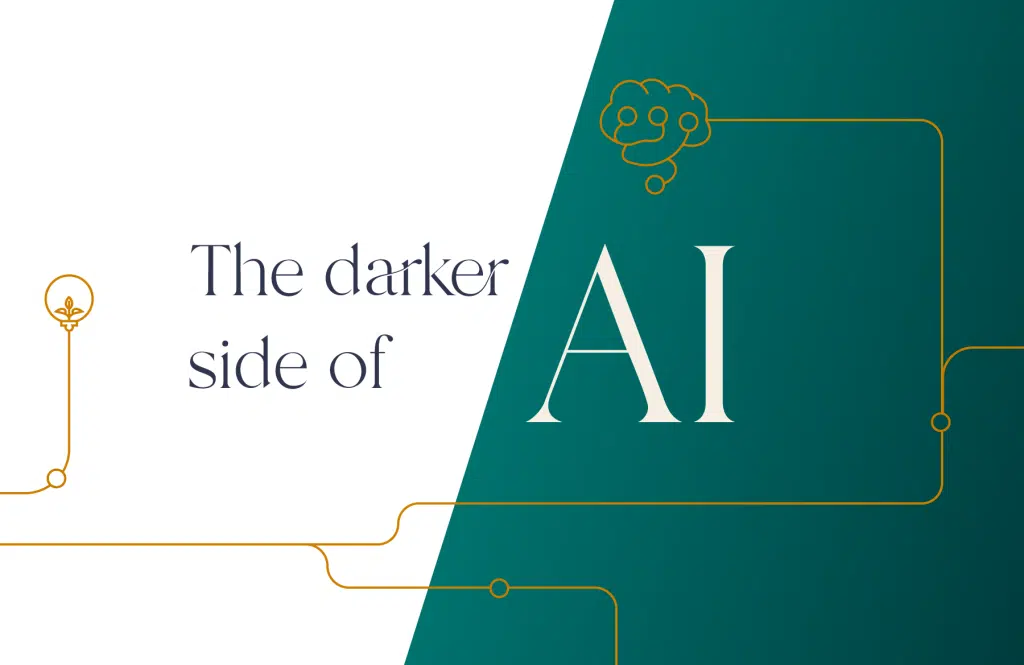
The dark side – an AI warning (and glimmers of sunshine)
As a fast-paced, innovative, and proactive agency, we have been thrilled by the benefits that AI has to offer. The technology has transformed our processes and sped up our deliverables with its speedy iterations, brainstorming ideas, concept-creating, video-segmenting, music-making, image-creating, and vector-drawing – to name a few!
Whilst speediness can be advantageous, it can also be challenging to keep up with the pace – it certainly poses some pressing questions; should this rapidity come with a warning? Will we lose the human touch in the process? Will we become too reliant on AI? Are we even still needed? Will we still have our jobs in a year?
These are very ‘personal’ worries and look somewhat insular, which is why we must consider the ‘bigger picture.’
There are certainly concerns raised when tech scion Elon Musk writes an open letter imploring a global six-month pause on AI and machine learning development. Elon’s was among 1,800 signatures, including cognitive scientist Gary Marcus and Apple co-founder Steve Wozniak, which poses the query of whether the ‘technological arms race’ will have a transformative effect on society – for the good or for the bad – read more by clicking here.
Fears have evidently been raised – but are they valid? In a nutshell, YES
One of our ‘go to’ entrepreneurs, inspirational pod-caster Steven Bartlett released a 2hr episode with the terrifying title: ‘EMERGENCY EPISODE: Ex-Google Officer finally speaks out on the dangers of AI!”
The episode features Mo Gawdat, ex Google X (the innovation arm) Chief Business Officer, who resigned in 2018 on the day that he witnessed machine learning without being instructed. The machines were in effect ‘thinking, seeing, touching, reflecting and making choices’ by themselves. At the time, they had IQ’s of over 150 – a level which is no doubt rapidly increasing with the passage of time – explore the full episode here.
The machines already have so much data that the power could already be in their hands. But it’s not the hands of the AI we should be concerned about – it’s the people and businesses behind them. If we look to the nuclear arms race, we can compare our predicament to a tangible example within history. It wasn’t the “father of the atomic bomb” Robert Oppenheimer who was the problem, it was the potential mishandling of his discovery by others. Nuclear energy has changed the world for the better; however, there is still the threat that it could get into the wrong hands – and this is precisely how we should be looking at the development of AI.
What should we be mindful of? How do we stay in control?
If you are reading this and happen to be an AI developer, Mo Gawdat has this to say to you:
“If you are a skilled AI developer, you will never be out of a job so choose to be ethical.”
If, however, you are not, the way we can all help is by encouraging the government to act now by making AI EXPENSIVE and enabling revenue collection through taxes. This will go some way to remedy the problems that AI will inevitably unleash. The alternative is that the government does nothing, and furlough becomes a very real possibility within a year thanks to inevitable unemployment and obsoletion across multiple sectors.
Currently, the AI funds and rewards go to businesses and investors, as opposed to the country – this needs to change and change quickly if we want to avoid the previous scenario.
The solution?
According to former Google chief Mo, the answer is to tackle this escalation of AI head on. He quotes ‘Die Wise: A Manifesto for Sanity and Soul’ author Stephen Jenkinson, who, speaking about the environment, stated, “What’s happening with Climate Change – our world is dying, and hope is the wrong premise” – applying this to what we’re currently facing with the technological arms race. Hope cannot be the sole answer, making a real difference requires action – mixed with hope for good measure. Mo challenges us to educate ourselves and play an active part in containing AI before the genie is fully out the bottle and can’t be returned.
From us, however, the best advice we heard was: don’t miss out on new opportunities by being caught up in the uncertainty of the future. Use your judgment and create the best life for yourself.

